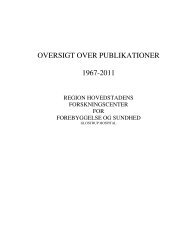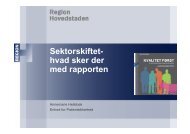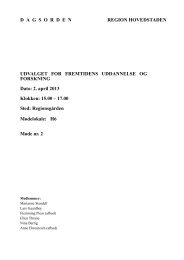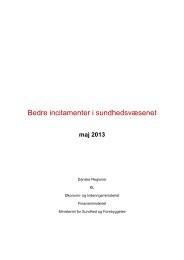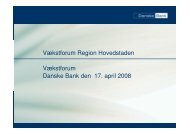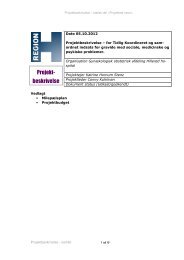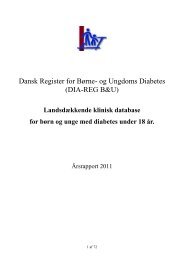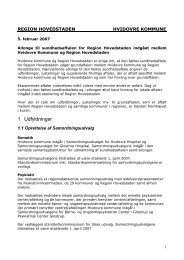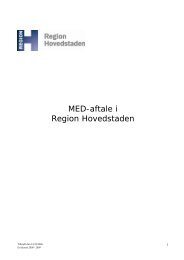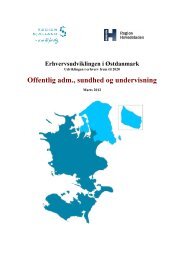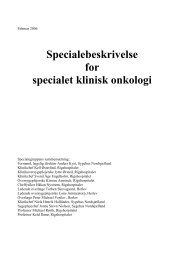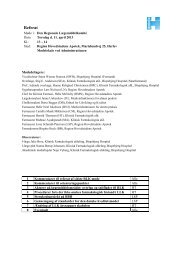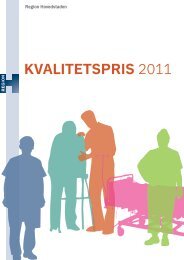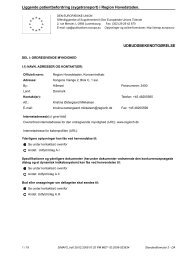Territorial Review Copenhagen - Region Hovedstaden
Territorial Review Copenhagen - Region Hovedstaden
Territorial Review Copenhagen - Region Hovedstaden
Create successful ePaper yourself
Turn your PDF publications into a flip-book with our unique Google optimized e-Paper software.
173<br />
Capital <strong>Region</strong> together with the City of <strong>Copenhagen</strong> and other<br />
municipalities in <strong>Copenhagen</strong> may opt to follow Vancouver‘s example and<br />
first commission a discussion paper for a <strong>Region</strong>al Affordable Housing<br />
Strategy, which would then inform a debate around a regional housing<br />
action plan. 25 Critical to the framing of this project is a consideration of the<br />
direct effects of growth management and land use planning regulations on<br />
the stock of affordable housing. 26 Accordingly, such an evaluation would<br />
need to take into account such factors as opportunity costs – of using the<br />
land for agriculture, the resources used to construct the house, and the cost<br />
of infrastructure, e.g. schools, police and fire, water and wastewater, and<br />
transportation services – the present location value and future location value<br />
of a development.<br />
The issue of housing has in many ways been de-institutionalised in<br />
Denmark. Since the dissolution of the Ministry of Housing in Denmark in<br />
2001, discussions on housing have been fragmented amidst myriad agencies<br />
and ministries. Over the course of the past several decades, the capacity of<br />
municipalities to support the development of homes of modest cost has been<br />
gradually eroded. The authority of municipalities to support residential<br />
building, including providing financial security, is, for example, limited to<br />
the options granted under social housing legislation, unless there is a<br />
separate legal basis, such as the Danish Integration Act. 27 In one sense,<br />
Danish municipalities had more planning powers over housing stock before<br />
1958, when the Housing Construction Law was ratified. 28<br />
Given evidence of the negative effects of rent control, the Danish<br />
Parliament might re-examine the implementation of this policy. The Danish<br />
Economics Council (De Økonomiske Råd) recently found that rent control<br />
was poorly targeted and misaligned with the original equity goals that<br />
inspired its creation. The Council argued that ―the highest benefits go to<br />
high-income groups, while the lowest benefits accrue to middle-income<br />
groups‖ (Economic Council, 2001). Other research in Denmark has<br />
documented that household wealth and income are positively correlated with<br />
the rent control benefit (Jespersen and Munch, 2001; Munch and Svarer,<br />
2002). Given these inconsistencies, it is appropriate to explore changes in<br />
existing rent control practices that would more effectively target the most<br />
disadvantaged groups.<br />
The national government could better facilitate the production of<br />
moderate-cost housing in the <strong>Copenhagen</strong> metropolitan region through<br />
allocating additional planning powers, especially with respect to limits on<br />
collaboration between the government and private developers. One of these<br />
powers could include the ability to sell land that would be used for social or<br />
moderate-cost rental housing at reduced prices. Unlike municipalities in<br />
England, Germany or the Netherlands, such a practice is currently not legal



